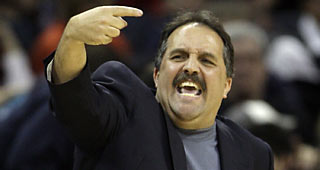The fragile job security of NBA coaches came to the forefront last week when Orlando Magic head coach Stan Van Gundy revealed that Dwight Howard wanted him fired. This revelation became another black mark on Howard’s reputation, as many wondered why he would throw such a successful head coach under the bus.
Van Gundy is a first-rate basketball mind, but he’s not the one responsible for the excellent defense Orlando has played over the last few years. Howard has won three consecutive Defensive Player of the Year Awards for a reason: he’s a 6’11, 265 center with a 7’4 wingspan and a 35’ vertical. There isn’t a coach in the NBA who couldn’t build a first-rate defense around him.
This isn’t the first time Van Gundy has had problems dealing with elite players either, as he was run out of Miami by Shaquille O’Neal in 2005. If an NBA coach can’t get along with Howard or Shaq, that’s on him; it doesn’t matter who was right or wrong.
There aren’t many athletic 6’10, 250+ human beings in the world; there are easily hundreds of people capable of running an NBA team. Kevin McHale, a former player who had only previously served as an interim head coach, has done an excellent job with the Houston Rockets. Erik Spoelstra, a former video intern with no previous head coaching experience until he was hired in 08-09, has been widely praised for his work with the Miami Heat.
If Van Gundy is tired of handling the egos of NBA stars, it’s time he joined his brother in the broadcasting booth. NBA coaches operate at the mercy of their players, and while it would be nice if every star player was as professional as Tim Duncan, it isn’t all that important to winning. Over the course of his career, there were few players as unprofessional as Shaq, and he will go down in history as one of the ten greatest players of all-time.
Orlando will have to fire Van Gundy at some point, but it won’t make much of an impact on their fortunes going forward. Their real problem lie in a series of mistakes their front office made in building a team around Howard, and as long as Otis Smith is still in charge of personnel, coaching changes are little more than rearranging the deck chairs on the Titanic.
Basketball coaches have far less to do tactically than football coaches, who are responsible for lining up 11 different players on each side of the ball and telling them where to go on every single play. Basketball is essentially a game of three-dimensional chess; the toughest part of an NBA head coaches’ job is selecting which pieces (players) to use.
Above a certain baseline of necessary competence, a.k.a. “The Del Negro Line”, there are diminishing returns on how much value a coach brings. A bad one may not deploy his players properly or feature the wrong ones offensively, but a good one can’t fix a fundamentally broken roster. A coach is only as good as his players, which is why the front-office is far more important to the success or failure of an NBA team.
If Oklahoma City GM Sam Presti had been in charge in Orlando in 2004, he likely would have gutted his roster after taking Howard. As a result, the Magic would have had a top-five pick in 2005, putting them in the position to take Chris Paul or Deron Williams. Instead, John Weisbrod kept a roster of mediocre veterans around Howard during his rookie season, causing them to drop to No. 11 in 2005, where they selected Spanish big man Fran Vazquez. Those were the decisions that ultimately sunk the Dwight Howard era in Orlando, not anything Van Gundy did or did not do.
From 2001-2009, nine men won the NBA’s Coach of the Year Award. By 2012, only one (Gregg Popovich in San Antonio) was still with the same team. Voting for the award is hardly an exact science, but it reflects an underlying reality: a good head coach is fairly replaceable.

Jonathan Tjarks wrote on the NBA for RealGM from 2011-2016 before joining The Ringer.
Follow @JonathanTjarks on Twitter.


